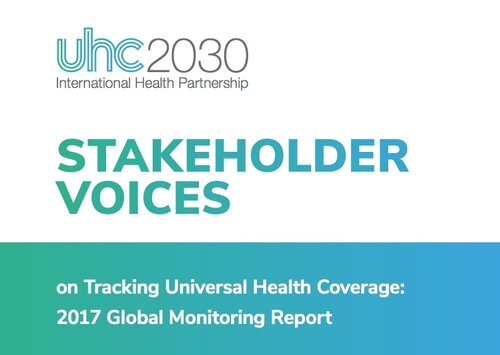UHC2030 hosted its annual UHC Day parliamentarian town hall to...
13 December 2017
Multi-stakeholder review of progress.

At least half of the world’s population remains without access to quality essential health services; 800 million people spend at least 10% of their household budget on out-of-pocket expenses for health care; and these costs drive almost 100 million people into extreme poverty each year.
These are alarming findings from the ‘Tracking Universal Health Coverage: 2017 Global Monitoring Report’ issued by the World Health Organization and the World Bank Group in December 2017.
The report reveals how countries are delivering on their commitment to expand coverage of essential health services and protection against the financial hardship of accessing health care, according to SDG target 3.8.
UHC2030 is committed to strengthening such accountability processes for UHC, and our diverse reach and convening power makes us well placed to facilitate multi-stakeholder dialogue for accountability.
The launch of the Tracking Universal Health Coverage: 2017 Global Monitoring Report provides an opportunity for multi-stakeholder review of progress.
UHC2030 has therefore compiled commentaries on the findings of the Global Monitoring Report from civil society, The Elders, the Independent Accountability Panel for Every Woman, Every Child, Every Adolescent, the Inter-Parliamentary Union, and youth.
Read Stakeholder voices: Tracking Universal Health Coverage: 2017 Global Monitoring Report here.
Here are some key quotes from the commentaries:
“The report’s findings leave no room for doubt – progress is too slow and in the case of financial protection and tackling discrimination, many countries are traveling in the wrong direction. Inequalities in service coverage remain unacceptably high while the role of civil society and community is far from adequately recognised.” Civil Society
“The report highlights the scale of the UHC challenge when it says that “At least half the world’s population does not have full coverage of essential services”. This should be the key headline that strikes readers of the report and hopefully spurs them on to push for credible and radical UHC policies worldwide”. The Elders
“Expanding UHC is a political process. It is about who has voice and power in defining health priorities, for whom, and how fairly they are financed. How many countries have policies to ensure people with disabilities, living with HIV, mental health conditions or in humanitarian settings are getting their share of UHC benefits?”
UN Secretary-General’s Independent Accountability Panel (IAP) for Every Woman, Every Child, Every Adolescent Commentary
“Leadership and political will are key to ensure that evidence-based legislation and policies are in place as well as solid accountability mechanisms to increase service coverage targeting the most in need without increasing financial hardship.” The Inter-Parliamentary Union
“Stigma, inequality and discrimination are barriers to UHC and therefore national level human rights laws should help ensure that essential services are available, accessible and affordable for everyone”.
Adolescent and Youth
Stakeholder voices on Tracking Universal Health Coverage: 2017 Global Monitoring Report
